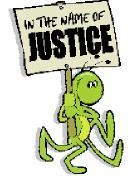
Welcome to the third instalment of In the Name of Justice, a collaboration between The Gleaner and the Ministry of Justice. Send your questions, comments and suggestions on the judiciary to editor@gleanerjm.com and the Ministry of Justice will respond.
Shaun Brown* was recently summoned for jury service in a murder case. He says he is fearful for his life, depending on the outcome of the case. As such, Brown plans not to turn up for court but wants to know the implications if he fails to do so.
Jury service is a critical element of the justice system in our country. A jury consists of ordinary citizens who are able to apply their common sense to the matter of determining the guilt or innocence of a fellow citizen accused of an offence. Under the guidance of the judge in the trial, jurors listen to the evidence presented and the case put forward by both sides. They then deliberate in private as to whether they believe that the facts as they have heard them prove the guilt of the accused person.
As citizens of their communities, jurors tend to understand the fine characteristics and habits of their society. Hence, juries play an important role in ensuring that the case brought against an accused person is considered with fairness and objectivity, and in light of the culture of our society.
What offences are tried by a jury?
a) All serious offences are tried by a Circuit (Supreme) Court judge sitting with a jury comprising 12 persons in murder or treason cases, and seven for other criminal offences.
Some offences tried by a jury include:
- Murder
- Manslaughter
- Rape and carnal abuse
- Robbery
- Arson
- Treason
Note: Offences (except murder) involving the use of a firearm are tried by a Supreme Court judge without a jury.
b) Jurors may also sit in civil cases. However, in such cases, either the claimant or defendant must apply to the court and request that a jury be empanelled to determine the facts of the case. In such matters the jury consists of seven citizens.
c) Jurors also sit with the coroner (resident magistrate) to hear evidence on the circumstances surrounding the death of a person where it occurs in sudden, suspicious or unnatural circumstances. They then make a determination of how, when and where the person died. This is called a coroner's inquest.
Who can serve on a jury?
The Jury Act sets out which persons are qualified and eligible to serve on a jury:
Every person:
a. Between ages 18 and 70
b. Whose name is on the current voter's list.
c. Who has a Taxpayer Registration Number.
Who is disqualified from jury duty?
The law disqualifies the following persons from serving as jurors:
a. Persons under 18 years of age or over the age of 70.
b. A person who is not a Commonwealth citizen.
c. A person who is unable to speak, read or write English.
d. A person awaiting a preliminary enquiry or trial in the Resident Magistrate's Court or trial in the Circuit Court for an indictable offence, that is, serious offences such as murder, shooting with intent and unlawful wounding.
e. A person who has been sentenced to a term of imprisonment for a period in excess of six months.
The Jury Act also exempts certain persons from acting as jurors because of their involvement in public life, such as politicians, some public officials and diplomats; by virtue of their participation in the justice system, such as judges and lawyers; or because they render essential services, such as medical doctors, nurses, soldiers, teachers and pilots.
Excuses from jury service
A person who is not exempt or disqualified from serving as a juror under the Jury Act may be excused from jury duty only if:
a. He or she is suffering from some illness.
b. He or she can satisfy the court that his attendance will cause undue financial loss or hardship to himself or his employer;
c. He or she can show some other good reason that the judge or magistrate believes is sufficient to excuse him from jury duty.
A person seeking to be excused from duty should declare his intentions at or before the time the jury list is finalised or at the time the jury is being empanelled.
Penalty for non-attendance
A person who has been duly summoned for jury duty and who does not appear, or who appears but refuses to serve, or who withdraws from jury duty without the permission of the court, or without good cause may be fined $2,000.
A person who makes a false statement with the intention of evading jury duty or helping another person to evade jury duty commits an offence and may be liable on conviction to a fine of up to $4,000 or six months' imprisonment.
Jury service is important to the proper functioning of our legal and justice systems. When called to fulfil our civic duty by serving as jurors, we must all do so responsibly. Through jury service we are able to do our part to protect and defend the rights of all Jamaicans in a very direct way.
*Name changed